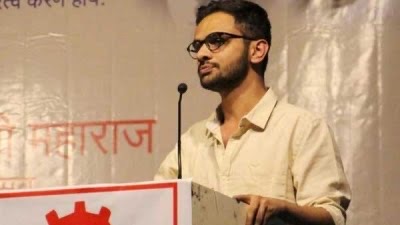The Supreme Court on Tuesday listed after four weeks, the bail petition of former Jawaharlal Nehru University (JNU) student and activist Umar Khalid, who was arrested under the Unlawful Activities (Prevention) Act for his alleged involvement in the larger conspiracy leading to riots in North-East area Delhi in 2020.
As soon as the proceedings started, the Bench of Justice Aniruddha Bose and Justice Bela M. Trivedi told Senior Advocate Kapil Sibal, appearing for Khalid, that it would have to go through the evidence on record and examine each document in order to assess whether the ingredients of the charges levelled against the JNU scholar in the charge sheet could be discerned.
Noting that the charge sheet has been submitted in the case, the top court of the country observed that it would match the ingredients of the offences with the charges.
Sibal sought listing of the matter after four weeks, saying that in the meantime, the Constitution Bench hearing in the case related to Article 370 would also be over.
The Apex Court then granted leave of four weeks and directed Sibal to place on record the evidence available under Chapters 4 and 6 of UAPA, along with details on how according to the Senior Advocate, it was not matching the facts submitted in the case.
The Senior Advocate asserted that he had submitted the pages and everything. Besides the evidence, he said his first submission was that Sections 16, 17, and 18 did not apply at all.
Additional Solicitor General (ASG) S.V. Raju, representing the Delhi Police, sought a copy of the evidence being filed by Sibal, to which the Senior Counsel agreed. Sibal also asked for a copy of the documents being submitted by the ASG.
Earlier on September 5, the Bench of Justice Bela Trivedi and Justice Dipankar Dutta had adjourned till next week, the special leave petition filed by Khalid against the Delhi High Court verdict, which refused to grant him bail last year.
The adjournment was caused due to absence of Khalid’s counsel, Senior Advocate Kapil Sibal, who was appearing in another case.
Sibal was appearing before the Constitution Bench led by Chief Justice of India D.Y. Chandrachud hearing the petitions challenging the abrogation of Article 370, which stripped the erstwhile state of Jammu and Kashmir of its special status.
Showing its reluctance to grant an adjournment for the fifth time since May, the Bench initially observed that Sibal was known to be busy and that the Court would not wait for any particular senior counsel.
However, it granted the adjournment, stating that no such appeals would be entertained on the next day, terming it the ‘last opportunity’.
Earlier on August 18, the Apex Court had adjourned the bail petition filed by the former JNU scholar.
The Bench of Justice Aniruddha Bose and Justice Bela Trivedi passed the order. Soon after the matter was taken up, the Bench told Senior Advocate Kapil Sibal, representing Khalid, that the matter will have to be heard on a non-miscellaneous day.
Tuesdays, Wednesdays and Thursdays are non-miscellaneous days, when the Supreme Court takes up hearing on lengthy matters.
After Sibal agreed to the suggestion, the Apex Court listed the matter for hearing after two weeks.
On August 9, the matter was listed for hearing before the Bench of Justice A.S. Bopanna and Justice Prashant Kumar Mishra. However, Justice Mishra recused himself from the case.
Justice Bopanna then referred the case to the Chief Justice of India for constituting another Bench to hear the case. This was the third adjournment.
On May 18, the Apex Court had issued notice to the Delhi Police on the bail application of Khalid.
After this, the hearing was adjourned twice – once on July 12 after the Delhi police sought more time to file a counter-affidavit and again on July 24, after a letter of adjournment was circulated by Khalid’s counsel.
The activist, who was arrested in September 2020 under the stringent provision of UAPA, has spent over two years and 11 months behind the bars.
Delhi Police had charged him with offences of criminal conspiracy, rioting and unlawful assembly. He was further booked under several Sections of UAPA.
The former JNU scholar moved the Apex Court against the Delhi High Court order of October 18, 2020, which refused to grant him bail in the case. The Division Bench of Justice Siddharth Mridul and Justice Rajnish Bhatnagar had dismissed Khalid’s appeal after hearing arguments for more than 20 days.
Khalid had previously approached the High Court challenging the dismissal of his bail application by the Karkardooma court in March 2022.


